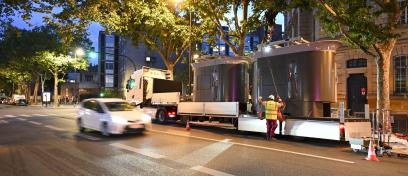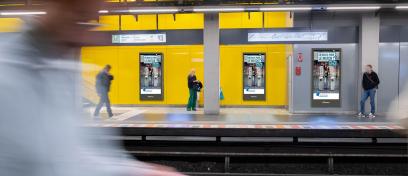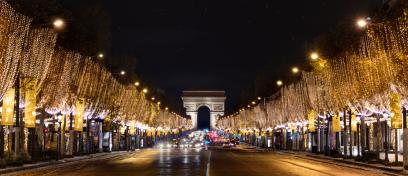JCDecaux regrets the Mayor of Grenoble’s decision not to put the City’s street furniture back out to tender
- Paris
Paris, 24 November 2014 - JCDecaux SA (Euronext Paris: DEC), the number one outdoor advertising company worldwide, regrets the Mayor of Grenoble’s decision, which is aimed at reducing the amount of street furniture in public areas.
Even though the contracts for JCDecaux’s cultural information columns and 2m
This decision amounts to a significant annual earnings shortfall for the local authority. The City is set to receive royalties of €653,000 excluding tax in 2014. As a result of this decision, the City is also foregoing street furniture and service opportunities that benefit all the residents of Grenoble, including innovative and high-quality local information. In accordance with the business model invented by JCDecaux, the City uses half of the advertising space for its public communications, including cultural events, news from voluntary organisations, and sporting events, etc. The other 50% is reserved for brand advertising, including more than 200 local and regional advertisers. Accordingly, the entire local economy will be penalised, since local retailers will lose some of their visibility. In addition, cultural operators will no longer benefit from the flagship advertising space represented by the Morris columns, which are dedicated to all kinds of shows.
Meanwhile, the passenger shelters installed for the City’s tramline and bus stops, the contract for which was signed with the Combined Public Transport Association (SMTC) for the Greater Grenoble Area, will not be affected. This furniture and its upkeep and maintenance will remain financed by advertising until June 2019. It is worth noting that Grenoble is a city that has one of the highest vandalism rates in France, including the breakage of over 1,000 glass bus shelter panels in some years, which JCDecaux replaces free of charge. In addition, SMTC receives annual royalties amounting more than €500,000, excluding tax.
The ideal model invented by JCDecaux, which has been exported world-wide, enables street furniture to be installed and maintained in cities, with no impact on local finances and taxpayers. As a partner to 3,700 French districts, the Group has always prioritised innovation for the benefit of local authorities, thereby enabling them to be equipped with systems that contribute to the vitality of the “smart, sustainable and innovative city”, ranging from bus shelters to self-service bicycles, and including connected and interactive services.
As a socially responsible company, JCDecaux has made sustainable development a focal point of its business model. Over the years, as its business activities have expanded, the Group’s commitment has been set down formally via proactive policies on quality and reducing the environmental impact of its business activities, and more recently via a global approach to environmental, social and societal responsibility. 50 years after the Group’s foundation, its culture and values are applied in order to pursue economic growth that cares for people and the environment. The Group’s historical roots in France are reflected by the fact that over 3,700 of its employees are French, i.e. 32% of its global headcount, and the company works with 1,700 French industrial suppliers.
Jean-Charles Decaux, Chairman of the Executive Board and Co-CEO of JCDecaux, said: “We note the political decision taken by the new Mayor of Grenoble. We regret the financial and social consequences of that decision, and observe the lack of consultation regarding the role of street furniture in the City. Many cities in the world have adopted the concept of street furniture advertising, and new cities are requesting this concept every year. Many of their representatives come to France, which we have made a showcase for our innovations, in order to draw inspiration from the furniture and services that we roll out for the benefit of local authorities. In an environment where local finances are under severe pressure, our business model based on financing services via advertising is more relevant than ever. We are all the more confident in its advantages, since the only city in the world to have adopted a law banning advertising, namely São Paulo, reintroduced advertising at the end of a five-year period, and entrusted JCDecaux with one of its advertising contracts, i.e. the contract for its digital clocks. JCDecaux and its teams are and will remain the preferred partners for districts, which have placed their trust in them for the past 50 years”.
Key figures
- 2013 revenues: €2,676m; Revenues for the first nine months of 2014: €1,974m
- JCDecaux is listed on the Eurolist of Euronext Paris and is part of the Euronext 100 index
- No.1 worldwide in street furniture (480,400 advertising panels)
- No.1 worldwide in transport advertising with more than 145 airports and more than 276 contracts in metros, buses, trains and tramways (379,000 advertising panels)
- No.1 in Europe for billboards (191,000 advertising panels)
- No.1 in outdoor advertising in the Asia-Pacific region (211,400 advertising panels)
- No.1 in outdoor advertising in Latin America (30,000 advertising panels)
- No.1 worldwide for self-service bicycle hire
- 1,082,400 advertising panels in more than 60 countries
- Present in 3,700 cities with more than 10,000 inhabitants
- 11,900 employees



